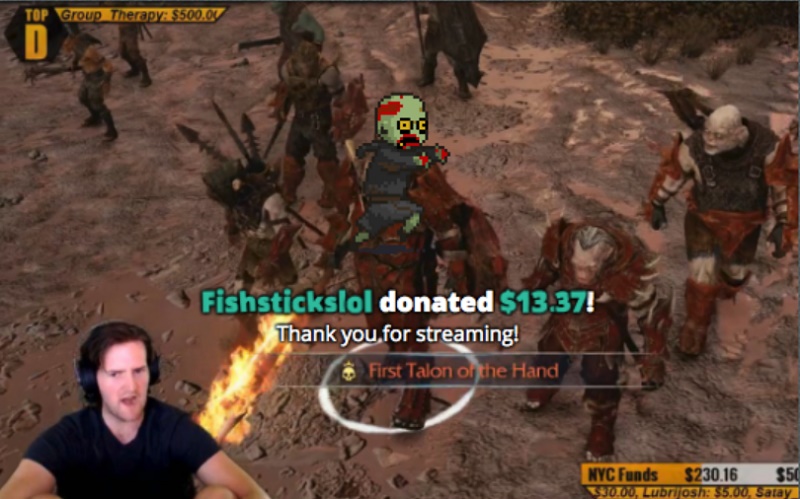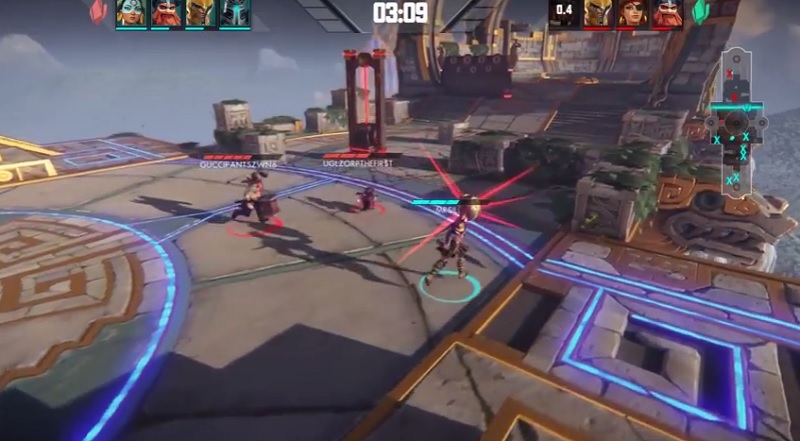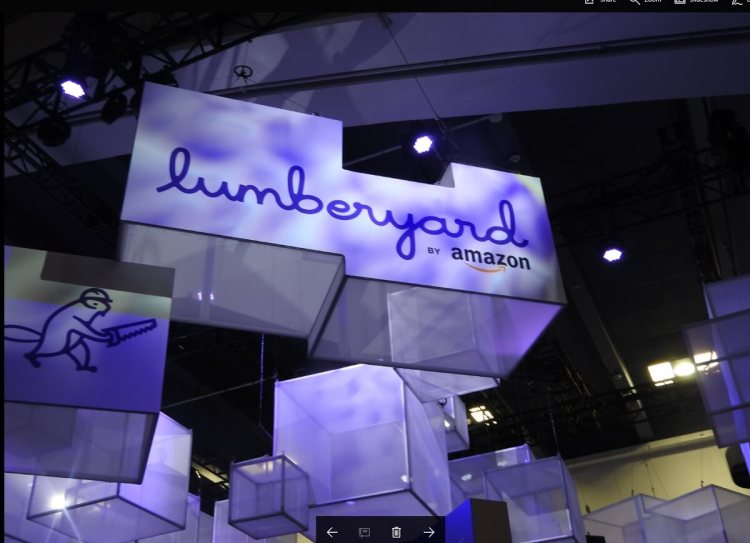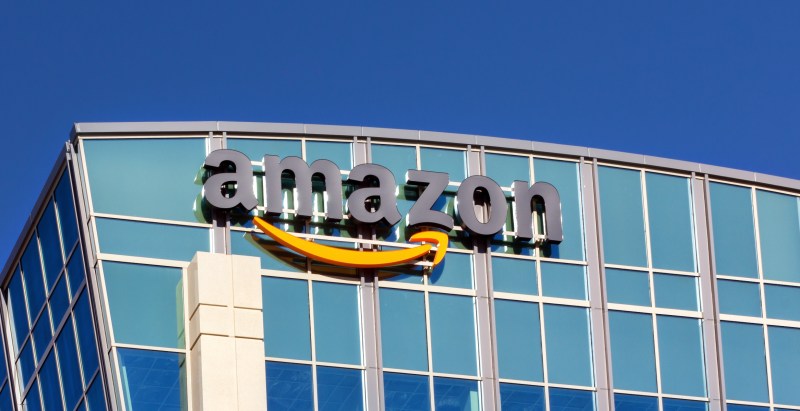
Above: Streamlabs lets YouTubers and Twitch streamers collect tips.
GamesBeat: What do you think about the health of the game industry right now? It’s good that when you shut down a studio, people can move on to a new studio. It still seems healthy as far as providing jobs for people. But what’s your own view of the development industry?
Smedley: I think it’s healthier than it’s ever been. There’s a feeling that — if you look at Steam, for example, you see that they opened up Steam Direct and there was just a flood of new games. Think about the job opportunities that provides. I look at Twitch and think, “That’s a company that didn’t exist a few years ago. Now there’s a whole new game-related space opening up new jobs.” Marketing people now can be a part of something that wasn’t there before. It means there are new jobs becoming available.
On the pure game development side, consoles appear to be sticking around. Their death has been greatly exaggerated. They’re doing well. On the PC side, where my personal gaming habits tend to take me, it’s good to be a PC gamer right now. The options we have available — I mean, Activision is bringing Destiny 2 to PC, thank God. I can’t wait to play it. I wasn’t into Destiny because it was only on console. That’s just not for me.
When you see the rise of China and Korea becoming serious tastemakers — remember, PUBG was made by a wonderful Korean company, Bluehole. Not only is revenue coming out of there and jobs opening up, but different jobs are appearing that haven’t existed before. It’s awesome.
GamesBeat: I just interviewed three brothers from Pakistan who’ve been making mobile games for six years.
Smedley: That’s awesome! Think about that. That just shows what I was talking about. This is the best time there’s been in my lifetime to be in the game industry. I can’t imagine doing anything else. This is just too much fun.

Above: Breakaway from Amazon has a lot of strategic depth.
GamesBeat: Esports seems to command a lot of attention these days. I see more esports startup getting funding.
Smedley: I like that it’s starting to become more mainstream. The DOTA Invitational had, what, a $23 million prize pool? That blows my mind. And now what I’m really liking is what Riot and Blizzard are doing, setting up these franchises. I’m not a sports guy. The Chargers just abandoned our city. But it would be awesome to have a San Diego esports team. I’ve seen them talk about bringing it to the Olympics. I’ll never run as fast as Usain Bolt, but every gamer has aspirations to be really good. Imagine getting a gold medal as a gamer.
GamesBeat: The professional sports owners are moving in. These franchises are getting very valuable.
Smedley: I’m excited about all of them except for the one the Patriots own. Everyone else, go for it.
GamesBeat: Anything else on your mind these days?
Smedley: Where our heads are at — I can’t talk much about the games we’re making, but we’re focused on getting that community started early, getting the games in front of customers. Amazon is going to do that in very different ways over time. There’s a belief her that it’s super important to get the games in front of customers early.
I liken that to another group in Amazon that’s doing similar things. Are you familiar with Amazon Video? They’re doing some cool things, and I think it’s going to change the industry. The same thing will come to games. They put up pilots, and they wait and see if customers like the show. If they do, then more gets made. Think about how transcendent that is for the economy of making series like that. You know you have a show people want to watch before you take a huge risk. To me that makes a lot of sense. It’s still good to take creative risks, and you see that with things like Manchester by the Sea. But I think the same thing is going to be true in games. Because of Twitch and the reach that Twitch Desktop has, being able to get games in front of customers early and get their feedback in meaningful ways earlier in the process, to me that’s a powerful change agent.
GamesBeat: I talked to Dave Jones at Cloudgine yesterday. He was talking about how there are still all kinds of obstacles to pulling off their creative vision for things like Grand Theft Auto and making it happen online. It’s why they created their engine for bringing more cloud-based processing into online games. Improbable is also working on bringing massive compute power for simulations in games. What do you think about this notion of where online games still need to make technical breakthroughs?
Smedley: You asked about why I joined Amazon. We have the Lumberyard engine. It’s going to be a very different — if you look at game engines now, Unity or Unreal, they’re focused mostly on the client experience. We’re doing a very different thing with Lumberyard. We’re taking it into the cloud and focusing on that. In fact, we’re not just doing that with Lumberyard itself. Jeff Bezos had a quote internally that I thought was fantastic. He wants us to make, in his exact words, “computationally ridiculous games.” You have no idea how freeing that is. You don’t limit yourself to what you can do right now.
That cloud notion is super important. The concept of being able to spin up huge servers that can support games — forget about 2,000 or 4,000 people. We can do games that are a whole lot bigger. That’s why I like the direction of the Lumberyard engine. It focuses on the backend stuff that, frankly, nobody but Amazon can do. We’re part of AWS, and that’s a very large advantage in terms of our ability to bring games to life that you simply can’t do in other engines.
Sometimes, when we talk about this, it sounds like it’s too much, but it’s the opposite. When you come here, you realize, “Holy cow, we can do that here? Okay!” When someone says “computationally ridiculous” to me, I think, “Hold my beer.”
GamesBeat: What do you think of VR? What does it need?
Smedley: About five more years to lose the wires. I’m not VR’s biggest proponent. I think it’s too early to go in the mainstream. We need to support it, though, because there’s a learning curve associated with that. Five years down the line it’s going to become amazing. I feel the same way about AR.
The question is, business-wise, is it a little too early to jump in? Personally I think so. I do like the tech. It’s just that when I put on some of the headsets, as great as they are, after a while—you’re attached to all these wires. The tech will get better and then I think it’s going to really take off.


